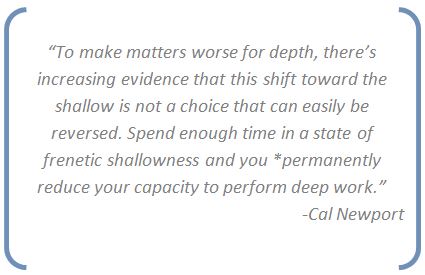In my last blog, I introduced Cal Newport and his concept of deep work, which raises some  uncomfortable dilemmas for KM. Cal is author of Deep Work: Rules for Focused Success in a Distracted World, a very provocative work from the perspective of KM. Here is his definition of deep work and why it matters.
uncomfortable dilemmas for KM. Cal is author of Deep Work: Rules for Focused Success in a Distracted World, a very provocative work from the perspective of KM. Here is his definition of deep work and why it matters.
Cal Newport: "Deep work" is my term for the activity where you're focusing without distraction for a long period on a cognitively demanding task. When you're working in a state of unbroken concentration, you're producing work at both a much higher rate and quality. Someone who is working with unbroken, intense concentration is just going to be far out-producing someone who is working on the same type of task but is more fragmented because of glancing at that phone or inbox.
Deep Work raises three important challenges for KM.
Collaboration Versus Deep Work
First, KM’s raison d'etre includes promoting connection and collaboration. Deep work is by definition solitary. How does this fit with the fact that most innovation and work we do in organizations happens in and through collaboration with others?
Here’s our exchange on this.
Carla: We hold meetings, we talk to each other, and we co-design things. Nothing ever happens or made it to market by one person, at least not anything big. I think of deep work as solitary. If it is solitary, then how does that mesh with the need to collaborate?
Cal: I think modern collaboration is a core issue right now in the knowledge economy. There tends to be two steps to successful collaboration and what it requires.
There’s a step where information is exchanged, ideas are generated, and serendipity is courted. [This is the role for KM.] This is often where that idea comes from, the inspiration piece of Edison’s quote. Then you have the perspiration step where ideas are thought about carefully. They’re developed and implications are thought through. The actual deep work is done. Both pieces are important and need to be protected.
What About Innovation?
Great ideas and innovations come at the intersection of seemingly disparate fields and from combining here-to-for unrelated thoughts. Sitting alone doing deep work may or may not create new connections. Here’s what Cal said when I posed that paradox to him.
Cal: You can structure periods for talking, planning, thinking, and brainstorming. And then you can structure periods for taking the results for deep thinking needed to transform a spark into an actual fire.
I’m worried now in our economy that we put too much emphasis, especially in modern tech companies, on just the spark of inspiration part. That’s all that’s emphasized. Let’s have a giant open office where at all points, all people could constantly run into each other and talk to each other and share ideas.
The Role of KM
The third challenge deep work poses for KM professionals is to help people learn faster and become experts sooner by enabling their deep work. Perhaps by having communities of practice go quiet a half-day a week (except for emergencies) in the same way some companies have declared email-free Fridays.
If you have other ideas for how KM can help, please comment below and attend our 21st Annual Knowledge Management Conference in April 2017. I invited Cal to keynote. He will address what KM people can do to facilitate more deep work and offer tips and techniques for doing more deep work in this age of digital distraction.
To read the transcript of my interview with Cal Newport, click here.
To download the podcast of my interview with Cal Newport, click here.
